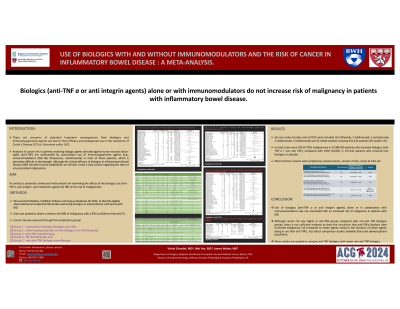Tuesday Poster Session
Category: IBD
P4396 - Use of Biologics and the Risk of Cancer in Inflammatory Bowel Disease: A Meta-Analysis
Tuesday, October 29, 2024
10:30 AM - 4:00 PM ET
Location: Exhibit Hall E

Has Audio

Vishal Chandel, MD (he/him/his)
Brigham and Women's Hospital, Harvard Medical School
Boston, MA
Presenting Author(s)
Vishal Chandel, MD1, Wei Yan, MD2, James Walter, MD3
1Brigham and Women's Hospital, Harvard Medical School, Boston, MA; 2Albert Einstein Medical Center, Philadelphia, PA; 3Einstein Healthcare Network, Philadelphia, PA
Introduction: Biologics & immunosuppressive agents used in Crohn’s Disease (CD) or Ulcerative colitis (UC) can have long-term consequences. Analyses of cancer risk in patients receiving biologics against tumor necrosis factor-alpha (anti-TNF) are confounded by concomitant use of immunosuppressive agents (e.g. immunomodulators (IM) like thiopurines, methotrexate). Current literature does not provide clear evidence for causal association between biologics and cancer risk in Inflammatory Bowel Disease (IBD). We aim to conduct a meta-analysis to study the effects of biologics (anti-TNF-a, anti-integrin, anti-interleukin agents) use for IBD on the risk of malignancies.
Methods: We searched all databases till 2023, to identify eligible studies examining potential harms of biologics in adult patients ( >18 years) with IBD. Data was pooled to obtain a relative risk (RR) of malignancy with a 95% confidence interval (CI). Cancer risk was assessed by five comparator groups: 1)combination therapy (biologics plus IM), 2)control group (placebo or non-biologic, non-IM therapies), 3)anti-TNF monotherapy, 4)IM monotherapy and 5)non-anti-TNF biologic monotherapy.
Results: 26 case control studies and 13 RCTs were included involving 341,414 patients (CD and/or UC). Overall, there were 299 (0.79%) malignancies in 37,989 IBD patients who received biologics (anti-TNF a + non anti-TNF), compared with 1092 (0.62%) in 175,245 patients who received non-biologics or placebo. Most common cancers were lymphomas, cancers of skin, breast, renal & GI tract. 35 studies reported comparison of biologics with/without immunomodulators against non-biologics. Overall, RRs of cancer risk were not significantly higher in non-biologics compared with biologics groups. [RR=0.95 (95% CI 0.64-1.42)]. 7 studies reporting comparison of anti-TNF agents with non-anti-TNF agents (newer biologics) yielded statistically significant results. [RR=1.54 (95% CI 1.11-2.13), I2 =0%, P=0.01].
Discussion: Use of biologics alone or with immunomodulators was not associated with an increased malignancy risk in IBD patients. Although cancer risk was higher in anti-TNF against non-anti-TNF biologics groups, we do not have sufficient evidence to draw conclusion that anti-TNFα blockers have increased malignancy risk compared to newer agents. This is due to less duration of newer agents being in use than anti-TNF’s, less direct comparison studies (five) & skewed patient population. More studies are needed to compare anti-TNF biologics with newer non-anti-TNF biologics.

Disclosures:
Vishal Chandel, MD1, Wei Yan, MD2, James Walter, MD3. P4396 - Use of Biologics and the Risk of Cancer in Inflammatory Bowel Disease: A Meta-Analysis, ACG 2024 Annual Scientific Meeting Abstracts. Philadelphia, PA: American College of Gastroenterology.
1Brigham and Women's Hospital, Harvard Medical School, Boston, MA; 2Albert Einstein Medical Center, Philadelphia, PA; 3Einstein Healthcare Network, Philadelphia, PA
Introduction: Biologics & immunosuppressive agents used in Crohn’s Disease (CD) or Ulcerative colitis (UC) can have long-term consequences. Analyses of cancer risk in patients receiving biologics against tumor necrosis factor-alpha (anti-TNF) are confounded by concomitant use of immunosuppressive agents (e.g. immunomodulators (IM) like thiopurines, methotrexate). Current literature does not provide clear evidence for causal association between biologics and cancer risk in Inflammatory Bowel Disease (IBD). We aim to conduct a meta-analysis to study the effects of biologics (anti-TNF-a, anti-integrin, anti-interleukin agents) use for IBD on the risk of malignancies.
Methods: We searched all databases till 2023, to identify eligible studies examining potential harms of biologics in adult patients ( >18 years) with IBD. Data was pooled to obtain a relative risk (RR) of malignancy with a 95% confidence interval (CI). Cancer risk was assessed by five comparator groups: 1)combination therapy (biologics plus IM), 2)control group (placebo or non-biologic, non-IM therapies), 3)anti-TNF monotherapy, 4)IM monotherapy and 5)non-anti-TNF biologic monotherapy.
Results: 26 case control studies and 13 RCTs were included involving 341,414 patients (CD and/or UC). Overall, there were 299 (0.79%) malignancies in 37,989 IBD patients who received biologics (anti-TNF a + non anti-TNF), compared with 1092 (0.62%) in 175,245 patients who received non-biologics or placebo. Most common cancers were lymphomas, cancers of skin, breast, renal & GI tract. 35 studies reported comparison of biologics with/without immunomodulators against non-biologics. Overall, RRs of cancer risk were not significantly higher in non-biologics compared with biologics groups. [RR=0.95 (95% CI 0.64-1.42)]. 7 studies reporting comparison of anti-TNF agents with non-anti-TNF agents (newer biologics) yielded statistically significant results. [RR=1.54 (95% CI 1.11-2.13), I2 =0%, P=0.01].
Discussion: Use of biologics alone or with immunomodulators was not associated with an increased malignancy risk in IBD patients. Although cancer risk was higher in anti-TNF against non-anti-TNF biologics groups, we do not have sufficient evidence to draw conclusion that anti-TNFα blockers have increased malignancy risk compared to newer agents. This is due to less duration of newer agents being in use than anti-TNF’s, less direct comparison studies (five) & skewed patient population. More studies are needed to compare anti-TNF biologics with newer non-anti-TNF biologics.

Figure: Upper part shows forest plots comparing biologics with/without immunomodulators vs non-biologics/placebo and anti-TNF biologics against non-anti-TNF biologics. Lower part shows tabular representation of demographic information of the studies which were included in meta-analysis.
Disclosures:
Vishal Chandel indicated no relevant financial relationships.
Wei Yan indicated no relevant financial relationships.
James Walter: Eli Lilly – Advisor or Review Panel Member. Medtronic – Consultant.
Vishal Chandel, MD1, Wei Yan, MD2, James Walter, MD3. P4396 - Use of Biologics and the Risk of Cancer in Inflammatory Bowel Disease: A Meta-Analysis, ACG 2024 Annual Scientific Meeting Abstracts. Philadelphia, PA: American College of Gastroenterology.
